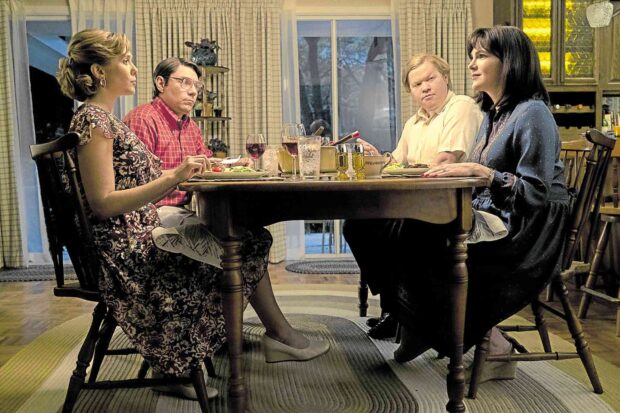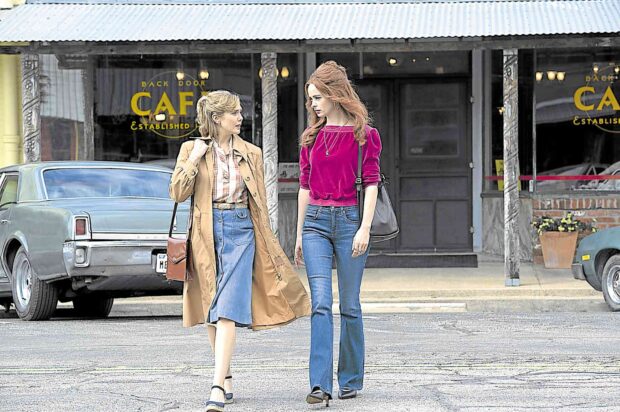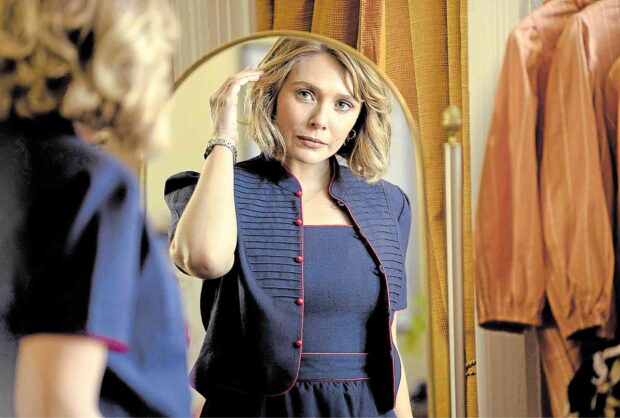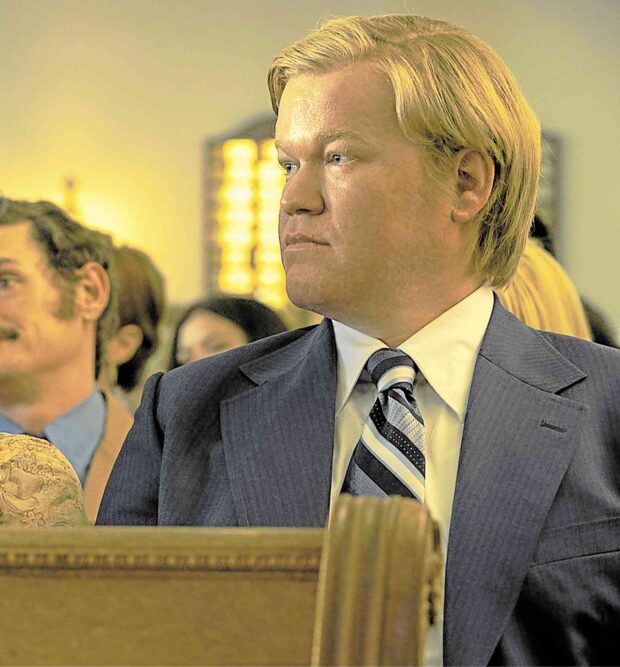Elizabeth Olsen, Jesse Plemons dissect love and tragedy in gripping true crime series
What would drive a churchgoing, choir-singing mother of two to hit another housewife with an ax 41 times? That isn’t just a click-baiting, “miron”-drawing plot from a writer’s overactive imagination.
In fact, it’s a true story based on a scandalous trial in 1980 that happened in Wylie, a smalltown in Texas with a population of 3,000. Controversially, the same subject matter is being tackled by two competing miniseries shown on different streaming platforms.
The seven-part Max Original show “Love & Death,” which began with a three-episode rollout on HBO Go last Thursday (followed by one episode weekly through May 25), tells the story of two couples: Candy and Pat Montgomery (Elizabeth Olsen and Patrick Fugit), and their friends from church and school, Betty and Allan Gore (Lily Rabe and Jesse Plemons).
They seem content with their lives in the bucolic Texan countryside… until an extramarital affair leads one of them to pick up an ax! In the early ‘80s, the ensuing tragedy was considered Wylie’s first murder case in 25 years.
The limited series is inspired by John Bloom and Jim Atkinson’s book, “Evidence of Love: A True Story of Passion and Death in the Suburbs,” and a collection of articles from Texas Monthly (“Love & Death in Silicon Prairie Parts I & II”).
The production initially plays out as a psychological domestic drama surrounding what local authorities described as a “crime of consequence,” but it soon turns into a gripping, edge-of-your-seat legal thriller whose outcome will leave some viewers on the fence.
Full of talent
More than its contentious themes on crime and culpability, the series benefits from award-worthy performances from all its principal actors. Anchoring the production’s terrific ensemble work are Elizabeth, who turns in a delicately nuanced portrayal that subverts expectations, and Jesse, the Oscar-nominated actor from Jane Campion’s 2021 screen drama “The Power of the Dog,” who conveys deep pathos with understated grace.
So you can imagine how thrilled we were when we spoke to the cast early this week to discuss how they built their terrific—and terrifying—characterizations from the ground up.
Interestingly, Elizabeth described Candy as “a fun character” to bring to life. The 34-year-old “WandaVision” and “Avengers” star explained, “When I first read this script, it felt totally playful in a way that I was curious about. I wasn’t focused on the fact that it’s a true-crime story—it wasn’t necessarily a box I needed to tick.
“It was more because of the people in the story and their relationships with each other in this world that [series creator, producer and writer] David E. Kelley (“Big Little Lies,” “Ally McBeal,” “Doogie Howser, MD,” etc.) created.
“So, when I met with David and Lesli Linka Glatter (“Mad Men,” “Homeland”), who directed five of the seven episodes, I felt very aligned with their vision. Moreover, they seem like such an exciting creative pair to do this.
“I loved the relationship built by Candy and Allan’s affair because, unlike most affairs, it wasn’t lust-filled. This was more about friendship, honesty and intimacy—something they didn’t have with their own partners. There’s an oddness to it that I liked and wanted to embrace.”
Character depth
If Lizzie, as everybody in the production calls the luminous Ms Olsen, considered the project “fun,” Jesse found his character “baffling.”
He said, “I first heard of the story via the Texas Monthly articles. It was such a strange and compelling story set in an interesting time and place in America. Reading those articles, I had a knee-jerk reaction to it, and every time I revisited it, I had a different take on it.
“As a character, Allan was baffling in a lot of ways. And I really like characters who don’t easily reveal themselves, their intentions or what’s going on in their heads. And I like the fact that, tonally, we meet these characters in a seemingly idyllic community.
“They all seem to have mostly everything that they want but, suddenly, we’re taken along with these characters through this horrific event, which introduces such a huge tonal shift. By Episode 3, it was kind of intimidating to figure out how to marry those two very different tones in the show.”
The rest of our Q&A with Elizabeth and Jesse:
The way the characters are written, they’re unconventional and unpredictable. Do you feel a heightened responsibility to “get it right” when a film or TV show you’re acting in is based on a true story?
Elizabeth: I don’t know how any story can “get something right” because I wouldn’t know how to articulate what “right” is. I have the same amount of respect for a fictional character as opposed to a real one.
Yes, there is a different kind of pressure and weight to a story when there’s truth to it. But I don’t want to hold on to that weight because that will make me second guess going into a character and trying to defend and understand her. In my mind, that weight is a writer or director’s responsibility.
As actors, we’re there to serve the story. What’s important for us is to approach these roles with respect and kindness and curiosity and playfulness. Also, we’re trying to tell an entertaining tale.
Jesse: “Getting it right” is subjective, you know? Some people may think we got it, while others may think we didn’t (laughs). When it’s a true story, you typically have some research material to go through and that’s what makes it fun.
But at least for me, I gather as much information as I can, then I try my best to capture my character’s essence as I have come to understand it. You can’t get too heady about that process.
What were the greatest challenges in creating your characters?
Elizabeth: The greatest challenge is, as Jesse mentioned earlier, dealing with the story’s tonal shift and trying to stay true to certain behaviors or character choices that we make early on, then continuing that thread during the big shift.
Another challenge is defending the hard-to-understand decisions the characters make. You have to figure out how to justify his or her actions and motivations—like Carol going through hypnosis in therapy.
I can’t understand how a woman so controlling could fall under hypnosis. So maybe she just needs to explore this for herself. Sometimes, it’s very hard to “get there” logically. So we’re trying to create motivations for some of their very confusing choices.
Jesse: Allan’s perspective of the whole affair in the aftermath of the murder was really interesting to me because a lot of the lines were taken from transcripts—they’re real. So, yeah, figuring out those decisions for my character was a fun challenge.
There’s another show (“Candy”) about the same story. Did you watch it, or did you decide not to get influenced by either the real events or the portrayals of actors from the other series?
Elizabeth: Well, we started filming before they did—and they finished before we finished (laughs)! We were both filming simultaneously, and so we had no idea what their version was. They had a really quick turnaround. I heard that they did a great job—but I don’t really know, because I never saw it.
Jesse: I just felt like it could be a parallel universe (laughs).
The true crime genre is growing in popularity, including among women. Why do you think are we fascinated with these stories, which are often about ordinary people driven to commit horrendous crimes?
Elizabeth: I don’t really know. It’s hard to make broad and sweeping statements without having done any research about it.
Jesse: Well, I think there’s a curiosity and fascination with why people do the things they do. People do crazy, strange and alarming things all the time, so it probably comes from a place of wanting to understand all that.



